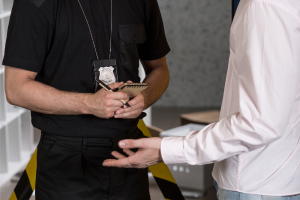
Are you facing burglary charges? The facts in your case are unique. It would be best if you had an experienced lawyer on your side. Find the best Los Angeles law firm for burglary charges. Contact Shah Criminal Lawyers! Our knowledge, skill, and experience can help clear your name and protect you. Call now for a free consultation and case evaluation.

A burglar is an individual who enters another person's property to commit a crime. Were the intentions misunderstood or misinterpreted? You need a Los Angeles burglary lawyer to determine whether you committed a crime.
Shah Criminal Lawyers can help you build a solid legal defense. Our Los Angeles Burglary lawyer will fight to reduce your sentence or avoid jail time entirely.
If you want to speak with an experienced criminal defense attorney about your case, call us at (909) 321-4212 or use our chat box on the right side of our website.

Compared to many other US states, California's laws on property crimes aren't as strict. However, in California, a conviction for some theft-related offenses can result in severe sentences, so anyone facing property crime charges needs to be aware of the relevant legal processes.
Burglary, for example, is a theft crime wherein a defendant steals property from another person's home or business. This crime is frequently confused with other property crimes.
As defined in the California Penal Code, burglary is the illegal entry of any structure to commit theft. A defendant entering a private residence or business is considered a burglary. Burglary, like other property crimes in California, is a "wobbler" offense.
A first-degree burglary takes place in "an inhabited dwelling," which is a general term that includes homes, boats, and any other building where people reside, as mentioned in Penal Code Section 460.
Even if neither the owner nor the occupant of the building is present when the burglary occurs, it is still first-degree burglary. The only exception is if a natural disaster caused the home to be abandoned and vacated.
First-degree residential burglary is a felony crime subject to California's three-strikes law. It means that if you have already received two strikes for other felony crimes or later receive one, you could be sentenced to life in prison.
All other burglaries, including those targeting commercial and non-residential buildings, are considered second-degree burglaries (Penal Code 460).
In contrast to first-degree burglary, they must prove that you intended to steal when you entered the structure. Additionally, it must establish that you were not authorized to enter the property or the area you entered.
Therefore, you cannot be charged with second-degree burglary if you entered a store during business hours without the intention of robbing it and were later accused of stealing when the opportunity presented itself.
Contact our skilled Los Angeles burglary attorney at Shah Criminal Lawyers immediately if you've been accused of a first or second-degree burglary or think you might be.

When we think of the legal penalties for burglary, most people imagine a lengthy prison sentence and thousands of dollars worth of fines. But that's only sometimes the case.
Since every criminal case is unique, a good Los Angeles criminal defense lawyer will know how to negotiate with the prosecutor and have your charges reduced or dismissed in many cases.
In Los Angeles, common penalties for burglary include the following:
If you are found guilty of felony first-degree burglary under California Penal Code Section 459, you may face the following legal consequences:
According to California Penal Code Section 459.2, a conviction for second-degree burglary is either a felony or a misdemeanor.
If you get convicted of second-degree misdemeanor burglary, you may be subject to the following legal consequences:
If convicted of commercial burglary, filed as a felony, it would result in a:
As examples mentioned above, a burglary conviction can have far-reaching effects. Your professional and personal lives are on the line. Contact our experienced criminal defense lawyers at Shah Criminal Lawyers to discuss the specifics and your legal options.

It is illegal to possess burglary tools intending to break into a house, building, car, or vessel in California, according to Penal Code Section 466. Tools used in burglaries include crowbars, screwdrivers, picklocks, and slide hammers. A person found guilty of possessing burglary tools faces a maximum of 6 months in county jail and a penalty fine reaching $1000.
Petty theft is a crime in California defined by Penal Code 484(a) PC as wrongfully taking or stealing another person's property when the property's value is $950.00 or less.
A misdemeanor called "petty theft" is punishable by
If the stolen property is worth more than $950.00, the more severe crime of grand theft can be charged. However, regardless of the value, certain property types, such as firearms, are treated as grand theft.
In California Penal Code 487, you commit grand theft if you illegally take another person's money, labor, or property worth $950.00 or more.
Grand theft is a wobbler, which means that it can be either:
The maximum sentence for the conviction is three years in prison.
Receiving stolen property is a crime that is defined by Penal Code 496 as purchasing, accepting, concealing, selling, or withholding any property that you know was obtained through theft or extortion. The crime carries a maximum 3-year sentence and may be a misdemeanor or felony.
The California Law that describes the offense of trespass is Penal Code 602, which entails staying or entering somebody else's property without their consent or authorization. A misdemeanor charge is generally against someone who breaks the law.
Here are some examples:
Penalties
Misdemeanor charges are brought against most California Penal Code Section 602 violations. The authorities may impose the following sanctions:
However, depending on the case's specifics, a prosecutor may charge trespassing as either a felony crime or an infraction.

A defendant charged with burglary requires a strong defense. Understanding common burglary defenses will help you at trial if you are accused of committing this crime.
To commit a burglary, you must have had the "intent" to steal something when you entered the building, according to the definition of the crime. The most critical component of the crime is intent.
The prosecutor's claim that you intended to steal must be proven beyond a reasonable doubt, so your attorney can contest it. It may be possible to have the charges reduced to a lesser offense or even dropped if your attorneys successfully raise some reasonable doubt about your intent.
You could be a victim of mistaken identity. A suspect's face was frequently visible from a distance in a dark environment or covered by a mask. Experienced Los Angeles criminal defense attorneys may try to argue that you were not the person who entered the house.
In some burglary cases, you can pursue an ownership claim or a right of possession defense. If you entered someone's home to take possession of the property you owned, you could not be charged with PC 459 burglary.
You and your attorney must be able to prove, though, that you had a reasonable belief that it was your property or that you had permission to take it. In other words, you can't steal something you had a good reason to think was already yours.
The prosecution has to prove that you did the crime with criminal intent and a criminal motive and that the criminal was personally involved. Charges may be dropped if there isn't enough evidence or the evidence has been changed.
Being accused of a crime, you did not commit and may not have any involvement in can be incomprehensible. Worse, there's no guarantee of dropping the charges or you won't be convicted.
False accusations occur, and you must act quickly if you're falsely accused of a crime. Here are some ways to protect yourself in this situation:

As outlined, California burglary laws are pretty broad. As a result, many suspects spend a long time in jail without a good lawyer. Contact our Los Angeles experienced criminal defense lawyer if you face burglary charges.
Do not get your future restricted by an arrest and bail. Burglary has severe consequences, and the law does not make any exceptions. The Shah Criminal Lawyers team is here to help because everyone deserves fair treatment in the criminal justice system.
We're standing by, ready to help you stop your criminal case and avoid conviction. To speak with one of our seasoned attorneys, call us at (909) 321-4212 or, if you like, use our online contact form to schedule an appointment.
